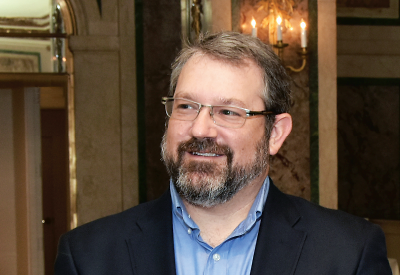John Donne once wrote that “No man is an island,” a phrase that reflects on how connected mankind is. At this year’s APA Annual Meeting in New York, the National Institute of Mental Health (NIMH) will host a research track centered around the idea that psychiatry is not an island, either. The six sessions in the NIMH track will explore how collaboration and technology can be used to bring data together, which can lead to breakthroughs in mental health.
The main event of the track will be a plenary lecture on Sunday, May 6, by NIMH Director Joshua Gordon, M.D., Ph.D., on computational psychiatry. Given the inherent complexity of the human brain and its billions and billions of neurons, harnessing the calculating power of modern computing seems like a natural fit for psychiatric research.
Gordon will discuss how computational biology can be used to integrate data gained from genetic, neurological, and behavioral studies. Such integration can help delineate how a set of gene changes might affect brain circuitry, how those circuit changes affect brain activity, and how that altered activity leads to abnormal behaviors. In addition to integrating multiple layers of data, computers can crunch a huge volume. In his talk, Gordon will also discuss how analysis of large datasets could uncover new diagnostic biomarkers for brain disorders.
Psychiatrists face real patients with real-world problems, but that doesn’t mean theoretical approaches cannot be beneficial, Gordon said. “By fostering an ongoing dialogue between theoreticians and psychiatrists, NIMH hopes to accelerate knowledge and improve the lives of individuals with mental illnesses.”
The theme of technological collaboration—teaming up with engineers and computer scientists—will also be addressed in three of the five research symposia that are part of the NIMH track.
On Saturday, May 5, Joel Sherrill, Ph.D., chief of the Psychosocial Treatment Research Program at NIMH, will lead a session that will explore how current technologies can be harnessed in today’s clinical practice. Devices such as wearable sensors, smartphones, and digital registries are already available for clinicians willing to try them. Such tools have utility at an individual level, by improving patient communication and patient monitoring. This session will also discuss how the technology can be applied at a broader level—for example, conducting clinical trials using mobile or wearable devices to acquire real-time data.
On Tuesday, May 8, Bruce Cuthbert, Ph.D., director of NIMH’s RDoC (Research Domain Criteria) Unit, will chair a symposium that addresses how best to diagnose psychiatric disorders. The speakers will explain the new tools being used to try and classify mental illness based on domains of functional impairment and/or other biologically based criteria.
Finally, on Wednesday, May 9, Michele Ferrante, Ph.D., a health scientist administrator at NIMH’s Behavioral Science and Integrative Neuroscience Research Branch, will lead a session that will delve deeper into the use of big data in mental health. The presenters will describe some of the main challenges in dealing with large and complex psychiatric datasets, as well as the opportunities. For example, presenters will discuss how big data can reveal which psychotropic medication would have the best chance of treatment success or reveal clues that can identify which at-risk youth will transition to psychosis in the near future.
The other two NIMH sessions will focus on a more classic collaboration–that between psychiatrists and other health care professionals. On Sunday, May 6, James Churchill, Ph.D., senior advisor to Gordon, will lead a panel on how clinicians of all stripes can work together to reduce suicide. One message will be the importance of screening and how it can be efficiently carried out in primary care and emergency department settings. The presenters will also discuss how population-level data can be leveraged to identify traits that might be indicative of near-term suicide risk in an individual.
Then, on Monday, May 7, Robert Heinssen, Ph.D., director of the Division of Services and Intervention Research at NIMH, will lead a session on coordinated specialty care (CSC), a team-based treatment for first-episode psychosis that integrates medical, psychosocial, and rehabilitative interventions.
The use of this evidence-based treatment has been growing rapidly over the last decade, with CSC now being used at over 130 clinics nationwide. There is still plenty of room to expand, though, and the presenters will discuss new research findings that may help existing CSC centers become even more effective, while enabling this comprehensive treatment to be successfully implemented at new sites. ■

